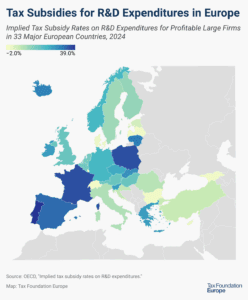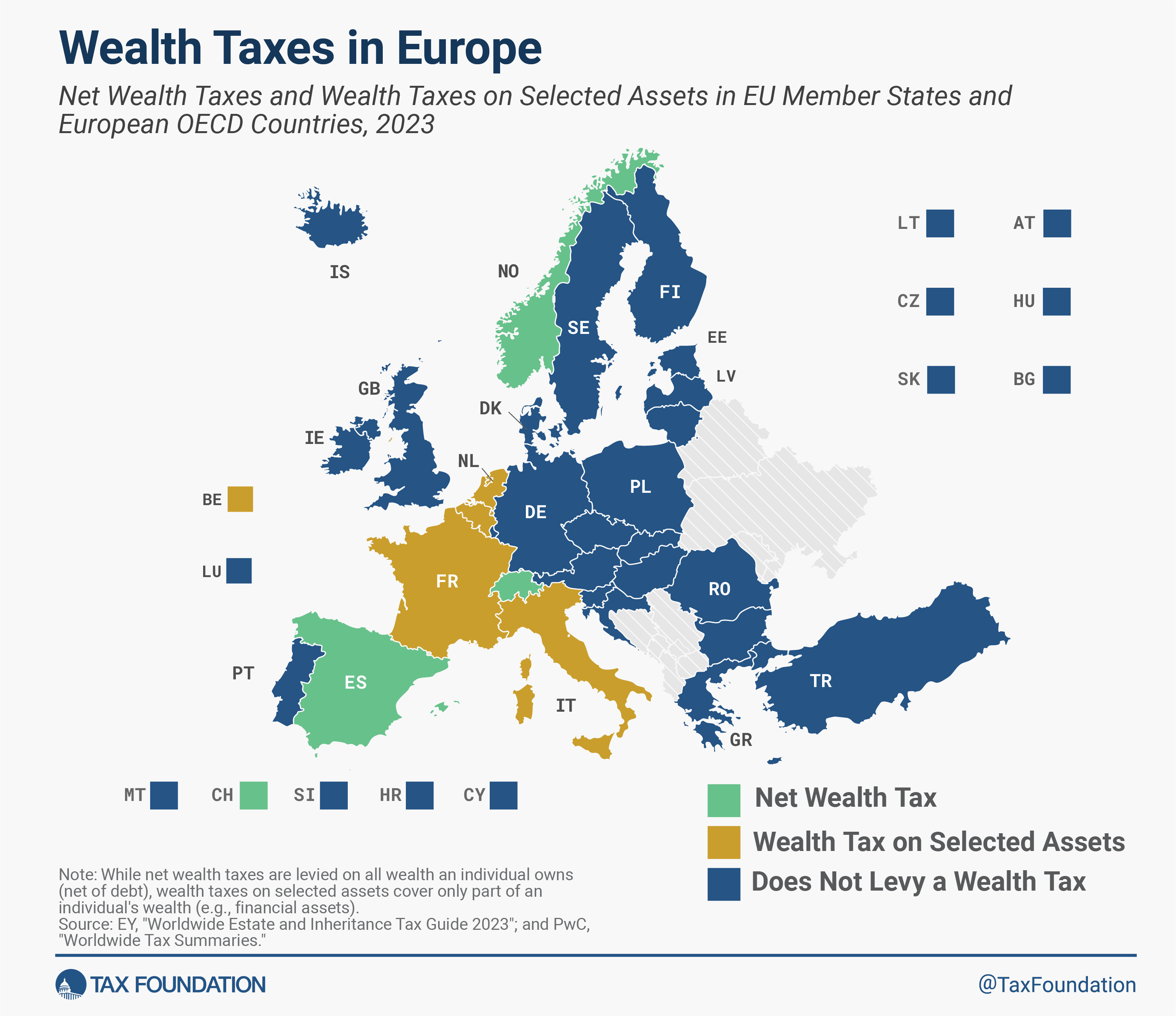
Wealth Taxes in Europe, 2024
4 min readBy:Net wealth taxes are recurrent taxes on an individual’s wealth, net of debt. The concept of a net wealth taxA wealth tax is imposed on an individual’s net wealth, or the market value of their total owned assets minus liabilities. A wealth tax can be narrowly or widely defined, and depending on the definition of wealth, the base for a wealth tax can vary. is similar to a real property taxA property tax is primarily levied on immovable property like land and buildings, as well as on tangible personal property that is movable, like vehicles and equipment. Property taxes are the single largest source of state and local revenue in the U.S. and help fund schools, roads, police, and other services. . But instead of only taxing real estate, it covers all wealth an individual owns. As today’s map shows, only three countries levy net wealth taxes in Europe—Norway, Spain, and Switzerland. France and Italy levy wealth taxes on selected assets but not on an individual’s net wealth per se.
Net Wealth Taxes in Europe
Norway levies a net wealth taxA tax is a mandatory payment or charge collected by local, state, and national governments from individuals or businesses to cover the costs of general government services, goods, and activities. of 1 percent on individuals’ wealth stocks exceeding NOK 1.7 million (EUR 150,000 or USD 160,000), with 0.7 percent going to municipalities and 0.3 percent to the central government. Norway’s net wealth tax dates to 1892. Additionally, for net wealth exceeding NOK 20 million (USD 1.94 million), the tax rate is 1.1 percent.
Spain’s net wealth tax is a progressive taxA progressive tax is one where the average tax burden increases with income. High-income families pay a disproportionate share of the tax burden, while low- and middle-income taxpayers shoulder a relatively small tax burden. ranging from 0.16 percent (in Navarra) to 3.5 percent on wealth stocks above EUR 700,000 (USD 757,850; lower in some regions), with rates varying substantially across Spain’s autonomous regions (Madrid, Andalusia, Cantabria, and Extremadura offer a 100 percent relief). Spanish residents are subject to the tax on a worldwide basis while nonresidents pay the tax only on assets located in Spain.
Additionally, the Spanish central government introduced a “solidarity wealth tax” in 2022 and 2023 (to be collected in 2023 and 2024) ranging from 1.7 percent to 3.5 percent on individuals with net assets exceeding EUR 3 million (USD 3.25 million). Under this new tax scheme, the central government collects any additional revenue from the solidarity tax once the regional wealth tax collection is deducted. Three regional governments of Madrid, Andalusia, and Galicia appealed the solidarity wealth tax to the Constitutional Court. When the court ruled in December 2023 that the solidarity wealth tax is constitutional (despite what experts argued), the Spanish central government extended the solidarity tax’s application until the regional financing system is reformed. Consequently, Madrid, Cantabria, Extremadura, and Andalusia restored the wealth tax so that the regional governments retain the revenues the central government plans to collect in 2024.
Meanwhile, Portugal’s decision to extend its tax regime for nonresidents is timely, since more Spanish taxpayers are considering changing their tax residence.
Switzerland levies its net wealth tax at the cantonal level and covers worldwide assets (except real estate and permanent establishments located abroad). The tax rates and allowances vary significantly across cantons. The Swiss net wealth tax was first implemented in 1840.
Wealth Taxes on Selected Assets
France abolished its net wealth tax in 2018 and replaced it that year with a real estate wealth tax. French tax residents whose net worldwide real estate assets are valued at or above EUR 1.3 million (USD 1.41 million) are subject to the tax, as well as non-French tax residents whose net real estate assets located in France are valued at or above EUR 1.3 million. Depending on the net value of the real estate assets, the tax rate ranges as much as 1.5 percent.
Italy taxes financial assets held abroad without Italian intermediaries by individual resident taxpayers at 0.2 percent and 0.4 percent for assets held in certain countries. In addition, real estate properties held abroad by Italian tax residents are taxed at 1.06 percent in 2024, up from 0.76 percent in 2023.
Since 2021, Belgium has had a solidarity tax or tax on securities accounts (TSA) of 0.15 percent on securities accounts with an average value of EUR 1 million (USD 1.08 million).
In the Netherlands, the value of net wealth, excluding primary residence and substantial interests in companies, is included in the income tax. Nevertheless, the Dutch Supreme Court ruled in 2021 that this system violates European law regarding property rights and non-discrimination. In 2022, a new temporary alternative system for the years 2023, 2024, and 2025 was proposed where each asset category (e.g., savings, debts, and others) would have its own deemed return. For 2024, the weighted average yield over all categories will be applied to the total assets above a personal exemption of EUR 57,000 (USD 61,697) to determine the taxable benefit that will be subject to tax at a flat rate of 36 percent. The government is aiming to have a new system based on actual returns by 2026.
Wealth taxes not only collect little revenue and create legal uncertainty, but an OECD report argues that they can also disincentivize entrepreneurship, harming innovation and impacting long-term growth. Instead of reforming and hiking wealth taxes in Europe, countries should repeal it.
Explore Wealth Taxes by Country
Net Wealth Taxes and Wealth Taxes on Selected Assets in EU Member States and European OECD Countries, 2023
| Country | Net Wealth Tax | Wealth Tax on Certain Assets |
|---|---|---|
| Austria (AT) | No | No |
| Belgium (BE) | No | Yes |
| Bulgaria (BG) | No | No |
| Croatia (HR) | No | No |
| Cyprus (CY) | No | No |
| Czech Republic (CZ) | No | No |
| Denmark (DK) | No | No |
| Estonia (EE) | No | No |
| Finland (FI) | No | No |
| France (FR) | No | Yes |
| Germany (DE) | No | No |
| Greece (GR) | No | No |
| Hungary (HU) | No | No |
| Iceland (IS) | No | No |
| Ireland (IE) | No | No |
| Italy (IT) | No | Yes |
| Latvia (LV) | No | No |
| Lithuania (LT) | No | No |
| Luxembourg (LU) | No | No |
| Malta (MT) | No | No |
| Netherlands (NL) | No | Yes |
| Norway (NO) | Yes | No |
| Poland (PL) | No | No |
| Portugal (PT) | No | No |
| Romania (RO) | No | No |
| Slovakia (SK) | No | No |
| Slovenia (SI) | No | No |
| Spain (ES) | Yes | No |
| Sweden (SE) | No | No |
| Switzerland (CH) | Yes | No |
| Turkey (TR) | No | No |
| United Kingdom (GB) | No | No |
Source: EY, "Worldwide Estate and Inheritance Tax Guide 2023"; and PwC, "Worldwide Tax Summaries." Share this article
Previous Versions
-
Wealth Taxes in Europe, 2023
4 min read -
Wealth Taxes in Europe, 2022
3 min read -
Wealth Taxes in Europe, 2020
3 min read -
Wealth Taxes in Europe, 2019
3 min read






